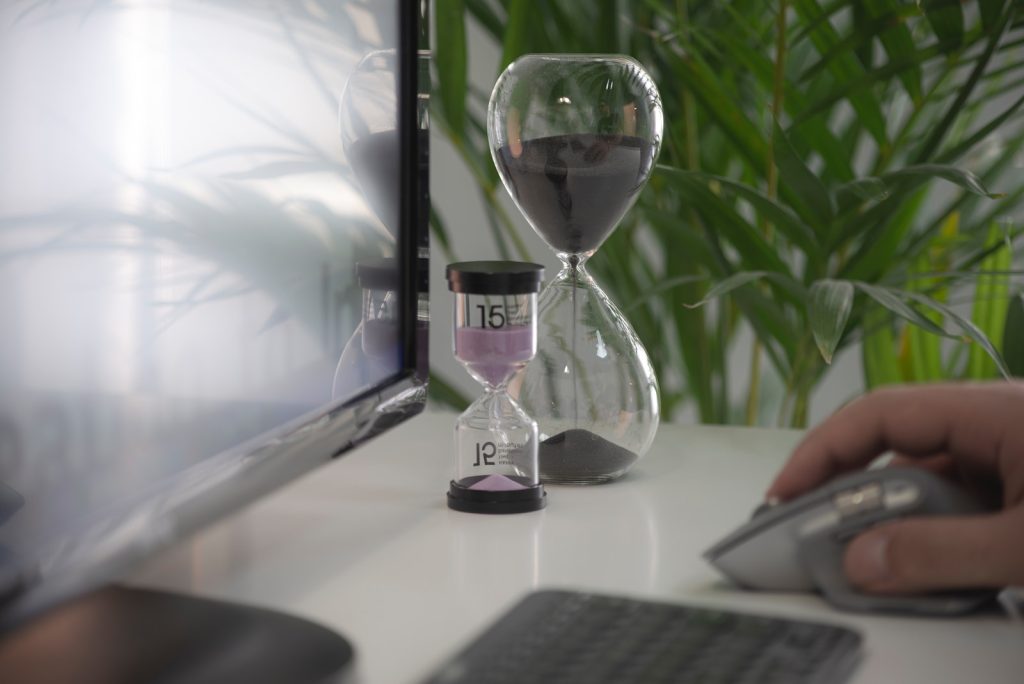So, there you are, sipping your morning coffee and scrolling through the latest tech news. As you swipe past stories of next-gen gadgets and bleeding-edge software, one debate keeps popping up: “Quick Typing: Are Mechanical Keyboards Truly Faster?” It’s a burning question for many, especially in an age where every millisecond counts. Let’s dive deep into this topic and see if we can uncover the truth.

When Every Key Matters
Picture this: It’s the late 1980s. Offices everywhere are filled with the rhythmic sounds of typewriters and early computer keyboards. Fast forward to today, where the gentle click-clack of mechanical keyboards is experiencing a renaissance. But why? What’s the big deal about these old-school devices?
Well, many claim that these keyboards not only provide superior tactile feedback but also significantly increase typing speeds.
The Nuts and Bolts
Mechanical keyboards are different from the membrane keyboards that often come bundled with computers. Inside each key of a mechanical keyboard is a physical switch that registers a keystroke. These switches, often referred to as Cherry MX switches, vary in feel and the force required to press them. Some are tactile and clicky, while others are soft and silent.
Now, here’s where things get spicy. The debate around “Are Mechanical Keyboards Truly Faster?” isn’t just about nostalgia or the pleasant sound they make. It’s about efficiency and speed.
Typing Efficiency
You might wonder: How can a keyboard make one type faster? The answer lies in the design and response time of mechanical keyboards.
When typing on a membrane keyboard, the user needs to press the key all the way down for it to register. In contrast, mechanical keyboards often have an actuation point that’s halfway, meaning the key registers before it’s fully pressed. This reduces the distance and time for each keystroke, potentially leading to quicker typing speeds.
Moreover, the tactile feedback from mechanical switches can improve accuracy. By feeling the actuation point, typists can avoid fully pressing down unnecessary keys, reducing mistakes and increasing overall typing speed.
Membrane vs. Mechanical: The Showdown
Remember when CDs and vinyl records had a showdown in the music world? Well, in the world of keyboards, it’s Membrane vs. Mechanical. While mechanical keyboards might have an edge in speed and accuracy for some, membrane keyboards are usually quieter and less expensive. However, when we return to the core question of “Quick Typing: Are Mechanical Keyboards Truly Faster?”, several studies and speed typing test results indicate a slight advantage for mechanical keyboards.
But let’s not forget personal preference. Some typists swear by their old-school membrane keyboards, while others won’t touch anything but a mechanical one. At the end of the day, it often comes down to what feels right for the individual.
A Key Point to Remember
While there’s evidence supporting the speed benefits of mechanical keyboards, there are also many other factors at play. Typing speed is influenced by practice, familiarity with the layout, and even the size and shape of one’s hands. A keyboard is just a tool. The real magic happens when the user and the tool become one, typing in harmonious synergy.
Mechanical Keyboards in the Modern Era
If you rewind the clock a decade or two, the dominance of membrane keyboards is undeniable. They were quiet, inexpensive, and got the job done. But the rise of gaming, coding, and a general nostalgia for tactile feedback saw the resurgence of it.
Gaming: The Catalyst
One of the driving forces behind the resurgence of mechanical keyboards is undoubtedly the gaming community. Professional gamers, streamers, and enthusiasts started endorsing mechanical keyboards because, in the fast-paced world of competitive gaming, every millisecond counts. The tactile feedback and N-key rollover (where multiple keys can be pressed simultaneously without ‘dropping’ keystrokes) provided by mechanical keyboards are crucial for gamers.
Imagine playing a high-stakes tournament. Your character’s movements are dictated by rapid-fire keystrokes. That slight advantage provided by a mechanical keyboard’s quick actuation can be the difference between victory and defeat.
Coding and Professional Use: Accuracy Over Speed
For coders, writers, and professionals, the debate of “Quick Typing: Are Mechanical Keyboards Truly Faster?” shifts slightly. While speed is beneficial, accuracy is paramount. A single mistyped character in a line of code can cause errors, and a misplaced word can change the meaning of a written piece.
Mechanical keyboards, with their distinct tactile feedback, allow users to feel each keypress, reducing the chances of errors. Plus, the satisfaction of typing on a mechanical keyboard can make those long hours of work slightly more enjoyable.
The Aesthetic Appeal: More Than Just Speed
Modern mechanical keyboards aren’t just about speed and efficiency. There’s an entire community dedicated to customizing these keyboards. From artisan keycaps to custom cables and RGB lighting, keyboards have become a form of self-expression. The aesthetics, combined with the functional benefits, make mechanical keyboards more than just tools—they’re a statement.
Looking Ahead: The Future of Typing
As technology progresses, so do our tools. While mechanical keyboards enjoy a beloved spot in the hearts of many, innovations like voice recognition, touch interfaces, and AI-driven predictive typing are changing the way we interact with devices.
But one thing is certain: the tactile experience, the satisfying click-clack, and the sheer joy of typing on a mechanical keyboard are hard to replace. Whether they are faster or not, they’ve carved a niche for themselves in the tech world, with a dedicated following that cherishes every keystroke.

The Community Connection: Mechanical Keyboards and Their Loyal Fanbase
Dive into any tech forum or visit a keyboard enthusiast group, and you’ll find heated debates, shared experiences, and a wealth of knowledge that goes beyond just typing speed. The mechanical keyboard community is vast, passionate, and incredibly supportive.
Meetups, Conventions, and Collaborations
Across the globe, mechanical keyboard enthusiasts gather at meetups and conventions. They’re not just there to showcase their prized keyboards but to exchange ideas, share innovations, and even collaborate on new designs and projects.
Think about it. How many gadgets in your life have dedicated conventions where aficionados fly from different countries just to attend? It’s this level of passion that sets the mechanical keyboard community apart.
Crafting Custom Creations
Within this community, there’s a subculture dedicated to crafting custom keyboards. From hand-wiring individual keys to creating bespoke keycaps with intricate designs, these artisans take the concept of “Quick Typing: Are Mechanical Keyboards Truly Faster?” and add layers of personalization and craftsmanship. It’s not just about speed anymore; it’s about creating a piece of art that’s uniquely yours.
The DIY Spirit
One of the charms of mechanical keyboards is the ability to tweak, modify, and build from scratch. Unlike many modern tech gadgets, which discourage tinkering, mechanical keyboards invite it. There’s a thrill in soldering your switches, selecting the perfect keycap set, and finally assembling a keyboard that reflects your personality and preferences.
The Educational Angle
Beyond the sheer enjoyment, mechanical keyboards serve as an educational tool. Many young tech enthusiasts get their first taste of electronics, soldering, and DIY projects by diving into the world of mechanical keyboards. Schools and educational programs have recognized this and started incorporating keyboard-building sessions in their curriculum, providing a hands-on approach to learning.
The Grand Perspective
While the central debate around “Quick Typing: Are Mechanical Keyboards Truly Faster?” initiated our journey, it’s evident that the world of mechanical keyboards is so much more profound. They represent a fusion of technology, artistry, community, and education.
In today’s fast-paced digital age, where devices are often seen as disposable, the mechanical keyboard stands as a testament to durability, craftsmanship, and personal connection. They might be a tool, a gadget, a peripheral—but for many, they are a hobby, a passion, and a symbol of the timeless blend of form and function.
So, whether you’re a speed typer chasing milliseconds or an enthusiast appreciating the finer nuances of a tactile switch, the world of keyboards welcomes you. Dive in, explore, create, and most importantly, enjoy every keystroke.
Beyond the Keys: The Broader Implications of the Mechanical Keyboard Movement
While our journey has covered the technical and communal aspects of mechanical keyboards, it’s vital to recognize the broader implications of this movement in the tech world and beyond.
A Stand Against Planned Obsolescence
In an era where many electronics are designed with a limited lifespan in mind, mechanical keyboards defy the norm. With their durable build, replaceable parts, and the ability to mod and customize, they are a beacon against the trend of planned obsolescence. By choosing a mechanical keyboard, users are not only opting for a potentially faster typing experience but also making a statement against disposable culture.
Environmental Considerations
The modular nature of mechanical keyboards has an environmental edge too. Instead of discarding the entire device when a part fails or becomes outdated, users can replace individual components. This reduces electronic waste and encourages a more sustainable approach to tech consumption.
The Mental and Physical Impact
Ergonomics plays a crucial role in the conversation around “Quick Typing: Are Mechanical Keyboards Truly Faster?”. Mechanical keyboards offer various designs, key placements, and switch types that can be tailored to an individual’s physical needs, reducing strain and preventing injuries like carpal tunnel syndrome.
Moreover, the sensory feedback from the tactile switches can be mentally satisfying. The rhythmic sound of keypresses can be therapeutic, aiding concentration and offering a form of auditory feedback that many find comforting.
The Influence on Tech Design
The resurgence of these keyboards has broader implications for tech design as a whole. As consumers show a preference for durability, customizability, and quality, tech companies are taking note. We’re starting to see a shift towards products that value longevity, user-friendly design, and sustainable practices.
Looking Beyond the Horizon
While the debate around mechanical keyboards and their speed advantages will continue, one thing is crystal clear: the impact of this movement goes far beyond typing speed. It touches on sustainability, consumer choices, design principles, and the very way we interact with technology.
Who would’ve thought that a simple question about “Are they Truly Faster?” would unravel such a multifaceted tapestry? But that’s the beauty of exploration. One query leads to another, taking us on a journey that expands our understanding and challenges our perceptions.
In the end, it’s not just about the keyboard or the speed. It’s about choices, values, community, and the intertwining of technology with our daily lives. Whatever your stance on the topic, one can’t deny the profound influence and allure of the mechanical keyboard in today’s digital age. Embrace it, question it, but most of all, appreciate the rich narrative it brings to our tech-driven world.
Conclusion:
We journeyed through their tactile advantages, gaming and professional implications, and the passionate community behind them. Their resurgence challenges modern tech’s disposability, promoting sustainability and a stand against planned obsolescence. These keyboards represent more than speed—they’re a blend of artistry, technology, and community spirit, offering ergonomic benefits and pushing tech design towards longevity and user-focused innovation. Beyond mere peripherals, mechanical keyboards symbolize the interplay between technology and human values, highlighting the importance of mindful choices in our digital age.
Frequently Asked Questions (FAQs):
1. What is the primary difference between mechanical and membrane keyboards?
Mechanical keyboards utilize individual physical switches for each key, providing tactile feedback, while membrane keyboards use a different pressure pad system, making them generally quieter and less tactile.
2. How do mechanical keyboards potentially increase typing speed?
They often have a quicker actuation point, meaning the key registers before being fully pressed, reducing the time for each keystroke and potentially leading to faster typing speeds.
3. Why are gamers particularly fond of mechanical keyboards?
Gamers value the tactile feedback, N-key rollover, and quick actuation points that mechanical keyboards offer, ensuring precise and rapid responses crucial in competitive gaming scenarios.
4. Can mechanical keyboards help improve typing accuracy?
Yes, the tactile feedback from mechanical switches can enhance accuracy by letting typists feel the actuation point, reducing the chances of mispresses.
5. Are mechanical keyboards more durable than their membrane counterparts?
Generally, mechanical keyboards are known for their durability, often lasting longer than membrane keyboards due to their robust build and replaceable parts.

Experience is what matters at the end!!
Hi! This is Jacob Jay – founder of Keyboardgear.com! From childhood to adulthood, I’ve always remained passionate about IT, and the revolution in this industry, especially gaming on the PC can’t go out of my way. Since I’m an enthusiastic gamer, and I love to experience various gaming accessories, particularly mechanical keyboards, that really boost my gaming adventure manifolds. So, my nerve cells hit me to transfer my experiences into word form and share with others to identify the ideal keyboards perfectly fit for their gaming modes.
I know very well how hard it is to find the high-quality items available on the internet that ought to be exactly the same as seen as on the screen. But the counterfeiters have ruined the user’s trust. As I have passed all such situations, I’m obliged to deliver the genuinity and express the same as what I am saying.
So, now, I’m working on the mission to provide very helpful and frankly but trustworthy reviews and guides about various mechanical keyboards, mouses, and other gaming accessories as per my personal experiences and sound knowledge.
